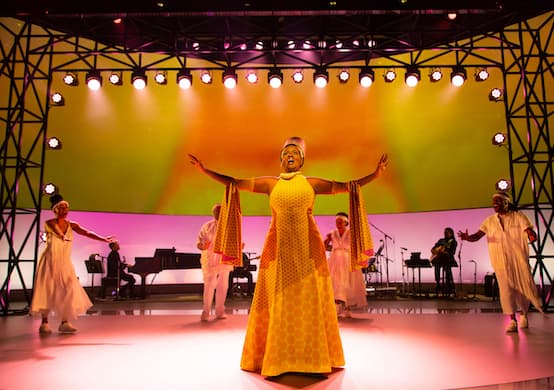Homage to Artist/Activist Miriam Makeba Is Beautiful If a Bit Too Reverential
The abundance of song and virtuosity in ‘Dreaming Zenzile’ — along with more substantive references to Makeba’s fight for freedom, and against bigotry — keep the show alive and buoyant.

In “Dreaming Zenzile,” songwriter/playwright/performer Somi Kakoma’s theatrical homage to the celebrated musical artist and activist Miriam Makeba, death arrives dressed in white, looking sharp and sounding glorious.
The setting is Makeba’s final concert performance, in southern Italy. It’s November 9, 2008, and in America Barack Obama has just become the first black man elected president. Makeba, an ardent opponent of apartheid in her native South Africa whose passion for social justice extended to international concerns, wants to remind her audience there is still work to be done. Yet a bevy of pale-costumed figures is beckoning her elsewhere.
The interlopers belong to the “Sangoma Chorus”; the first word indicates a traditional Swazi healer, as Makeba’s mother was. The healing these spirits have in mind involves taking the singer on a different journey — one that will reunite her with ancestors and lost loved ones, who are also played by members of the chorus. If it stands to reason that Makeba, portrayed by Ms. Kakoma, doesn’t want to die, the sheer magnificence of their singing, in both thrilling solo passages and harmonies that resonate in one’s bones, proves impossible to resist.
Blending traditional music and Afrosoul with jazz and American standards, as well as original material written or co-written by Ms. Kakoma, “Zenzile” — the title refers to its subject’s given first name — certainly reflects the breadth and beauty of Makeba’s artistry. Ms. Kakoma is herself a formidable singer, her sonorous voice stretching to clear, bright top notes. Like the other performers, she’s also a warm, winning presence on stage. Marjani Forté-Saunders’s lyrical choreography makes full use of their expressive power and grace.
In spite of the production’s assets — which include the smart, sensually vivid direction of Lileana Blain-Cruz, fresh off her richly imaginative staging of Thornton Wilder’s “The Skin of Our Teeth” at Lincoln Center — “Zenzile” can fall prey to the hagiographical leanings one associates with less classy fare, such as jukebox musicals. The Nina Simone tribute “Little Girl Blue,” staged off-Broadway just a few months ago, poses a handy contrast: Also written by a potent actress and singer, Laiona Michelle, it used a concert setting to trace the life and career of another venerated artist remembered for her activism as well as her music.
Ms. Michelle made Simone fully, deliciously human, investing her portrait with saucy humor and not shying away from the late legend’s foibles, from a quick temper with colleagues to her struggles with manic depression. “Zenzile” dutifully documents Makeba’s own considerable trials, among them an abusive early marriage and the untimely death of her only child, but Ms. Kakoma’s more soberly reverential tone makes her subject less intriguing as a human being.
As a performer, certainly, Ms. Kakoma provides ample evidence of Makeba’s strength and vulnerability, her stubbornness and her sexiness; the last quality becomes particularly compelling when “Zenzile” traces Makeba’s marriage to a black power pioneer, Stokely Carmichael, who is played and sung with sinuous charm by Aaron Marcellus.
Ironically, though, the script can dilute this flesh-and-blood appeal in its attempts to elevate its heroine through repetitive and sometimes boilerplate nods to Makeba’s legacy. “Your voice will continue the fight for freedom long after you’re gone,” the chorus tells her early on; toward the end, she is reminded, “You do not have to fight anymore. You have already given the fight to so many. The show is over.”
The abundance of song and virtuosity in “Zenzile” — along with more substantive references to Makeba’s fight for freedom, and against bigotry — nonetheless keep the show alive and buoyant. In addition to Mr. Marcellus, the chorus includes a majestic Phumzile Sojola; the lissome, honey-voiced Naledi Masilo; and Phindi Wilson, whose mighty soprano can pierce the air like a bullet or fold into a harmonic line like a sweet caress.
A four-piece band consisting of piano, bass, guitar, and percussion provides robust support, and Yi Zhao’s lighting and Mimi Plange’s costumes burst with color, adding to the production’s visual vitality. Ms. Kakoma first enters in a yellow dress, looking as if she were spun from sunshine. For the second act, she changes into black and royal blue — the chorus members wear swatches of the latter color—underlining both Makeba’s pain and the dignity with which she endured it.
Despite its shortcomings, “Dreaming Zenzile” proves a moving testament to these qualities, and a feast for the eyes and ears alike.

